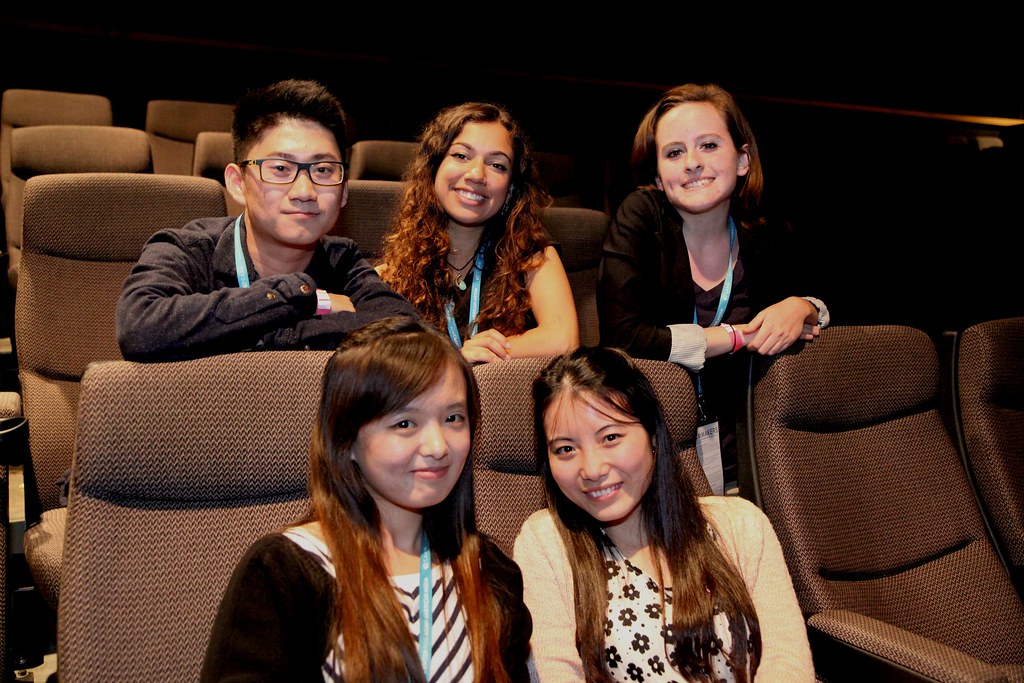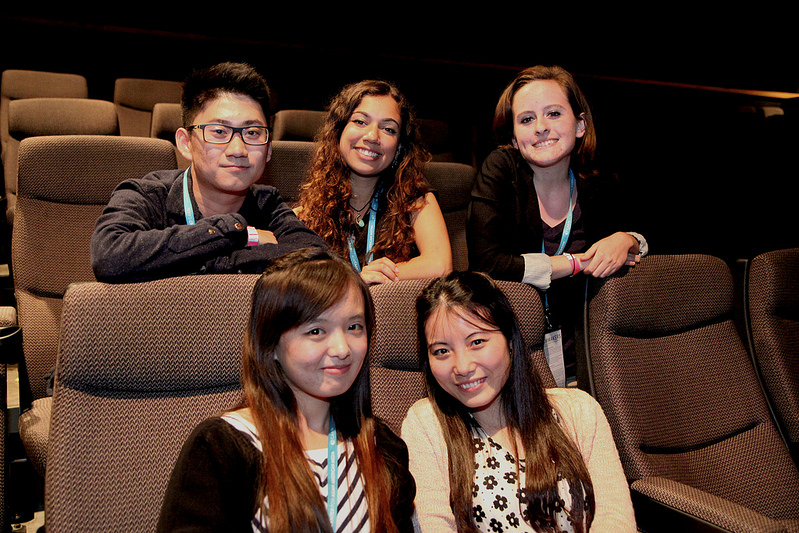 Lan Yan filmmakers, Pawara Soh, Jamie Oliveira, Danielle Schmidt, Sany Lu, and Lena Zeng in the seats of the Sundance Kabuki CInema for CAAMFest 2014 Sunday, Mar. 16. Their film Lan Yan will be screening at New People Cinema March 17. Photo by Lorisa Salvatin / Xpress
Lan Yan filmmakers, Pawara Soh, Jamie Oliveira, Danielle Schmidt, Sany Lu, and Lena Zeng in the seats of the Sundance Kabuki CInema for CAAMFest 2014 Sunday, Mar. 16. Their film Lan Yan will be screening at New People Cinema March 17. Photo by Lorisa Salvatin / Xpress
Hidden between the high rise apartment buildings, posh shopping districts and towering, geometric business headquarters of modern Shanghai lay clusters of shanty brick townhouses.
Reminiscent of traditional Shanghainese architecture, these “shikumen” buildings are deteriorated and often crammed with low-income families living in closet-sized bedrooms. Life in shikumen communities is messy and unglamorous, yet still endearing. This is the framework for Danielle Schmidt’s film, Lan Yan.
Schmidt discovered the shikumen last summer when she and several of her classmates from SF State’s cinema department travelled to Shanghai in search of a subject for their film. The students were enrolled in the International Documentary Film Workshop, a program that sends undergraduates abroad for one month to shoot, edit and produce their own documentary short.
A 12-year-old girl approached Schmidt and her crew, curious about their camera equipment and western appearance. She then invited them back to her townhouse.
The students became friends with the girl, Zhang JingFang and her father, Zhang JianXin. JingFang and JianXin star in Schmidt’s film, “Lan Yan,” which is named after the shikumen community they live in.
JingFang and her father are one of eight families living in a home with one kitchen and bathroom. When he is not working as a bus driver, JianXing cares for his daughter or plays mahjong with his housemates and friends from the neighborhood.
Simplicity of life in Lan Yan juxtaposes the encompassing industrious and rapidly growing Shanghai. Grappling with limited space and opportunities, residents of Lan Yan must learn to live with and, in some cases, love one another. In the face of conflict, the characters’ actions reveal the essence of human struggle and their emotions speak to a global audience.
“We all just fell in love with (the community),” Schmidt said. “There’s this universal language you can relate to and it keeps you interested in the story.”
Schmidt directed the film while four other students took on production, editing and cinematography. According to Schmidt, working with students who have different visions for the final product was challenging for the group, but collaborative and creative problem solving eventually made the final product stronger.
“A lot of us were pretty opinionated about what we wanted,” said the film’s producer, Pawara Soh. “But at the end of the day something has to be done.”
The group to submitted the film to CAAMFest, a Bay Area film festival showcasing Asian and Asian American independent films. Schmidt was apprehensive when she sent the film in after the festival’s admission deadline but they were shocked and delighted to hear that the film was nonetheless accepted.
Schmidt hopes that the topical issues in Lan Yan resonate with the audience at CAAMFest. The filmmakers emphasize the value in human connection, question the definition of community and balance isolation and financial wealth with companionship and modesty.
“I didn’t grow up in a shikumen community, and a lot of the things they do I didn’t necessarily do as a kid,” said Schmidt, “But their intentions, feelings and thoughts are so relatable that there’s no way any audience in any culture wouldn’t feel it.”
Lan Yan will play at Sundance Kabuki Cinemas March 16, and New People Cinema March 17.







